In 2012, Colorado and Washington voters legalized recreational cannabis sales, with the first dispensaries opening in 2014. A lot has changed in the decade since. More than half of people in the United States now live in a state that allows legal recreational cannabis, while 74 percent live in a state that has legalized either medical or recreational use, according to Pew Research Center.
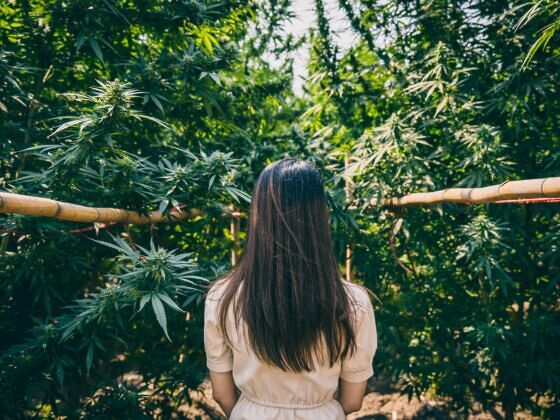
The First Comprehensive US Cannabis Travel Guidebook Points Readers to the Country's Best Weed Experiences
The cannabis scene is drastically different than it was even five years ago as more and more states legalize, with a long list of dispensaries and growers, lounges, tours, and culinary experiences found from coast to coast. Industry experts predict the legal recreational market to reach $50.9 billion in value by 2029, and Forbes puts the value of the cannabis tourism market alone at $17 billion with plenty of room to grow.
Yet cannabis remains federally illegal. This has led to a patchwork of different laws in each state, and plenty of confusion for travelers looking to consume in a place that’s new to them. Added to that, reliable cannabis travel information can be hard to come by as businesses from magazine and book publishers to tour companies remain reluctant to fully dive into cannabis until federal legalization happens.
Cannabis journalist Lauren Yoshiko’s new book, “Green Scenes: A Guide to Legal Cannabis Destinations and Experiences Across the US“, is the first comprehensive cannabis travel guide tohelp curious minds plan a weed-focused trip in the country.
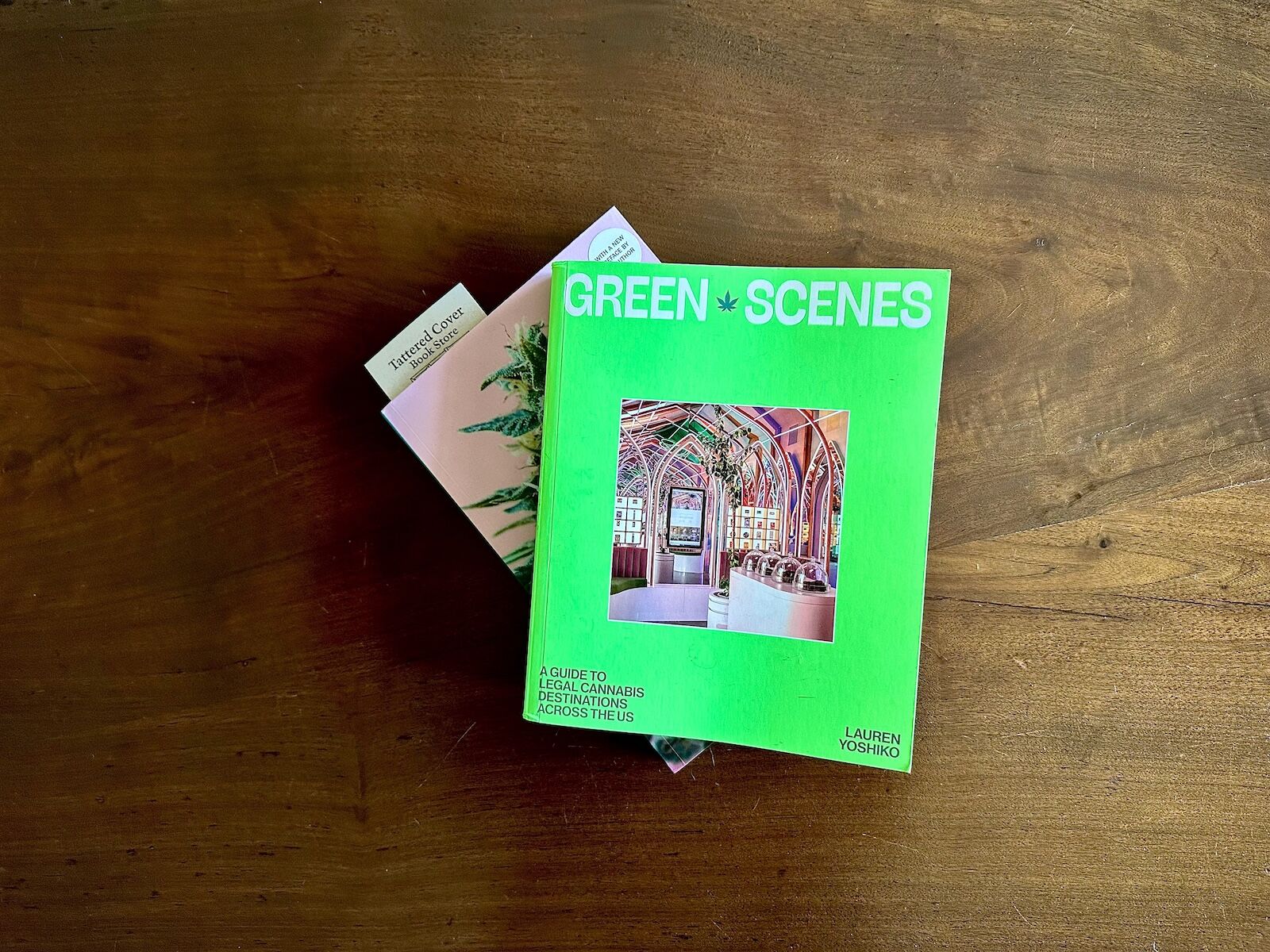
Photo: Nickolaus Hines
“The goal is not just to show readers that beautiful dispensaries exist and look stylish,” Yoshiko says over a video call from Portland. “It’s like, this is a whole new world with what we can do with weed. The experiences available to somebody who enjoys weed are boundless, and I think there’s so much room for innovation in that space.”
The book highlights the various ways that people can take part in local cannabis activities of all kinds. There are culinary events and private cannabis chefs, lounges, and art collaborations, to name a few.
Hardie Grant, Yoshiko’s publisher, is based in Australia with production hubs in the US and the UK. For the American market, Hardie Grant was looking for an author who was a cannabis expert. Just as important was finding someone who knows how to curate a guidebook about the people and businesses who operate ethically.
“I was first approached by Hardie Grant, and they were like, ‘why aren’t there more weed books?’” Yoshiko says. “And actually, America is still really weird about weed, even if we have it legal in so many states. It’s just a freaky thing for a lot of these big publishers, and they were like, ‘well, we’re not freaked out.’”
Yoshiko quickly saw how the book could easily spiral into thousands of pages long even with the slightly more narrow focus of only covering states with legal recreational use. The publisher’s guidance? “Curate, curate, curate,” Yoshiko says. No small task, but one that Yoshiko is uniquely positioned for.
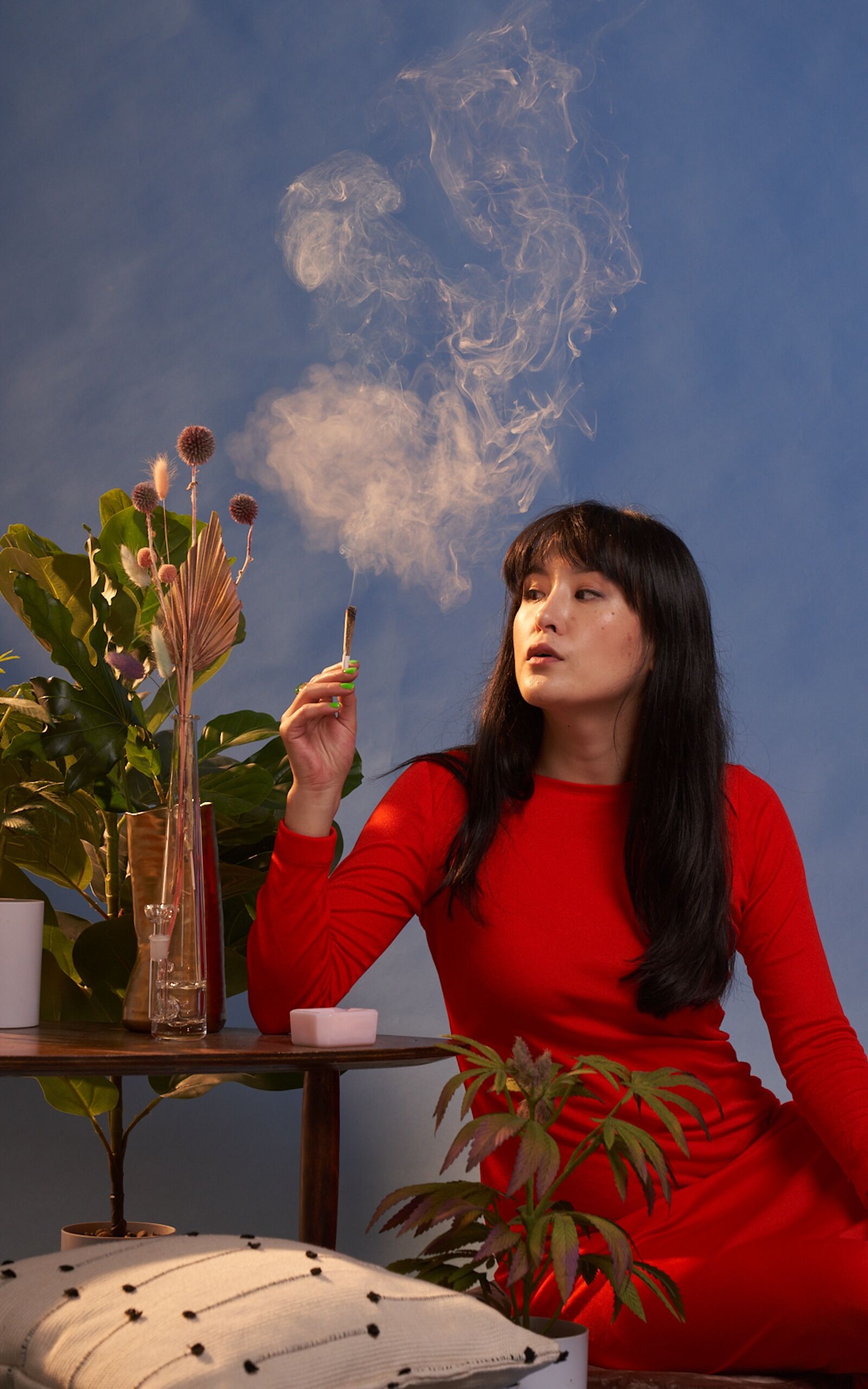
Photo: Lauren Yoshiko
In early 2014, Lauren Yoshiko wrote a cannabis strain review column for the Portland, Oregon, alt weekly Willamette Week under the pen name Mary Romano. It was a time when being associated with cannabis could derail a career. Oregon legalized recreational use in late 2014 with sales to start in 2015, the same year that Yoshiko dropped the pseudonym.
Since then, Yoshiko has worked at cannabis farms, ran dispensaries, and moderated cannabis panels in the United States and Canada. She continued writing about the plant for outlets like Forbes, Broccoli, Thrillist, Conde Nast, and Rolling Stone. She also co-hosted the Broccoli Talk podcast.
Yoshiko’s most recent cannabis writing is largely tied to her previous work with Broccoli, a high-design, elevated take in cannabis media. “Green Scenes” follows a similar design-forward aesthetic that’s as playful and light as it is informative for the cannabis traveler. In the few weeks I’ve had the book sitting on my coffee table, it has inevitably drawn comments about its presentation.
“I wanted it to look really fresh and modern, so that people do a double take,” Yoshiko says. “Something where they can say, ‘This is weed now? This is not the weed I knew from the ‘90s and 2000s.’”
Presently, along with her new book, she operates the Sticky Bits newsletter that covers cannabis updates for consumers and industry people alike, product recommendations, and reported deep dives into both the science of cannabis and the market itself. Throughout her career, she writes in the book, she was “observing the way [cannabis] stigma ebbed and flowed across the continent as those with cannabis-related charges struggled to get justice.” She found that the “deeper the pockets and cleaner the criminal record, the much higher likelihood of accessing and succeeding in the new world of legal weed.”
There’s long been an underlying fear among cannabis devotees that, while helping with public perception and innovation, legalization would make cannabis fall prey to big corporate investment and create a market like big tobacco. It has, in some ways, proven true. But Yoshiko’s book shows that there are still many ethical, people-first cannabis companies providing destination-worthy experiences if you know where to look.
“I love finding real farmers, not just weed growers, but people who are selling homegrown eggplants on the side of the road, but there’s also a weed farm there,” Yoshiko says. “That just feels so much more like how things should be instead of these isolated fenced in places in the middle of nowhere.”
To keep her book relevant in an ever-changing market, she had a fast turnaround time — especially for the book world. Conversations with her publisher started at the end of 2022, with a deadline of April 2023. The book shipped out in early 2024. Between when editing wrapped up in October 2023 and printing in March, a lot changed. “Unfortunately, there are a couple of spots in the book that no longer exist, and were I to take a closer look at all of the cities again, there’s probably a few spots I’d add.” There’s always the opportunity for a second edition, though.
“We still have so far to go” when it comes to cannabis tourism matching the depth and breadth of experiences that people can get in other types of travel, Yoshiko says. She adds that seeing the relative dearth of places to feature outside of the West Coast and Colorado was “a reminder of how hard it is to build something special in the space, because it’s really expensive and local laws make it hard. A lot businesses didn’t survive the last few years.”
That said, there are businesses and legislation driving the industry in new innovative directions. Vermont, for example, banned plastic packaging. Businesses in states that don’t allow public consumption lounges have created membership clubs where people can freely consume in a social environment rather than trying to find a private space (a particularly thorny issue in cannabis tourism, since public consumption is outlawed in all legal states and accommodations where one can legally light up are limited at best). Other states allow dual licenses so that things like houseplants can be sold alongside cannabis.
Yoshiko’s reporting is all the more relevant in states where cannabis was more recently legalized. New York, for example, where there has been increased attention on the number of illegal cannabis shop storefronts (and the seemingly unavoidable cannabis aroma just about anywhere you go, as I noticed recently on a trip in January) that have popped up since the slow legal rollout started in 2021.
“Green Scenes” is an essential guidebook for anyone looking to work cannabis tourism into their travel plans. Below is just a taste of what people can find.
Meowy Jane in Portland, Maine
The cat motif goes beyond the punny name at this women-led, cat-themed dispensary in historic Old Port. Founders and co-owners Noelle and Joe Albert made Meowy Jane feel like one part cat cafe; one part upscale boutique with clothing, jewelry, and consumption accessories; and one part dispensary selling cannabis products from vetted farms. There are robot cats throughout the shop that move and purr (which you can meet on the dispensary’s Meowy Team page), items like cat-shaped pipes, and cat adoption events with local shelters.
Meowy Jane: 3 Market St, Portland, ME 04101
The WOODS WeHo in West Hollywood, California
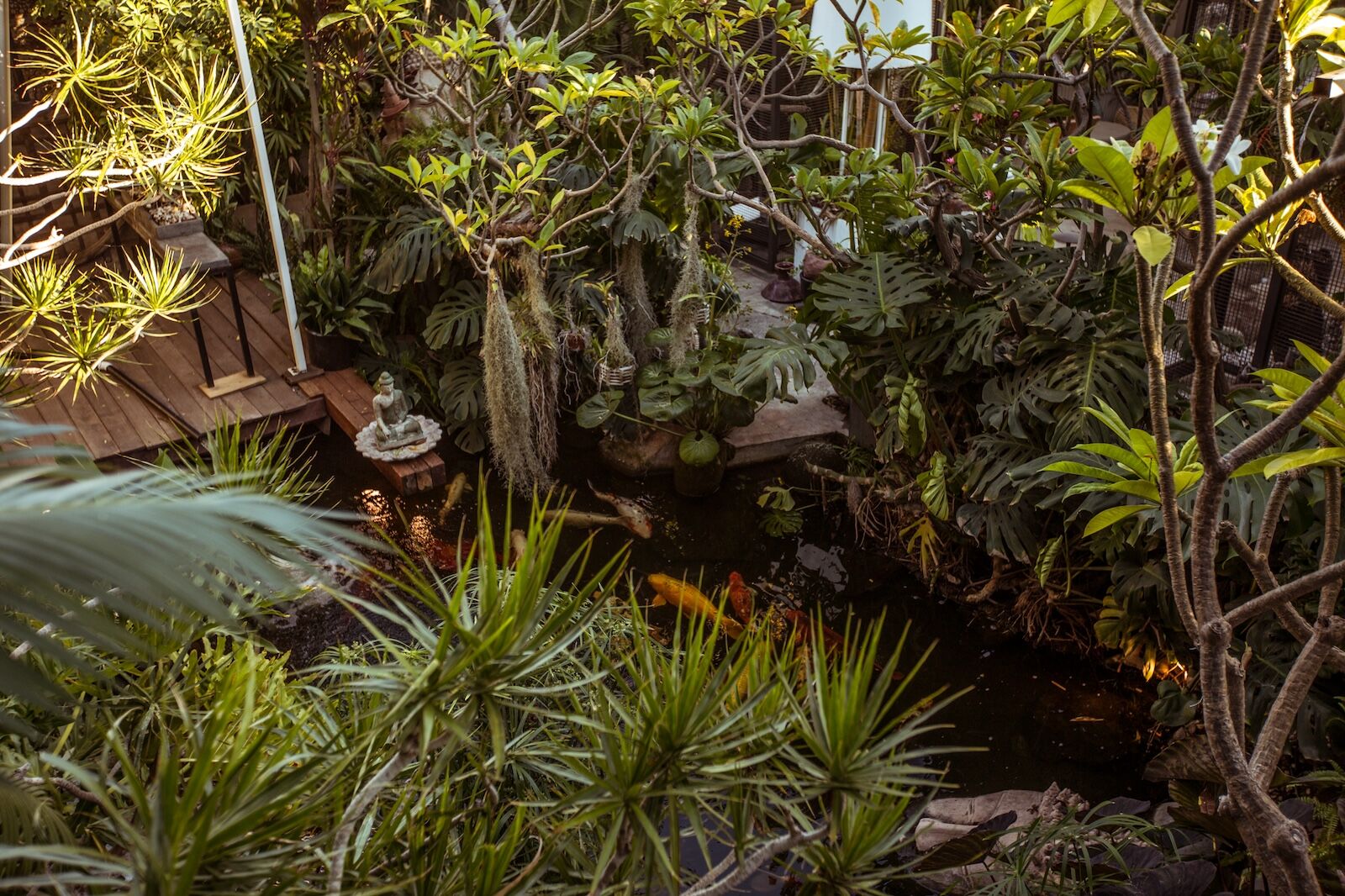
Photo: The WOODS WeHo / Lauren Yoshiko
Co-founded by Woody Harrelson and Bill Maher, this West Hollywood consumption lounge is a plant-filled garden with various seating areas, parrots that have been here since it was a private courtyard for the Schoos Design studio, and a koi pond. Private cabanas each have a different theme. This being Hollywood, don’t be surprised if you see some stars among the guests.
The WOODS WeHo: 8271 Santa Monica Blvd, West Hollywood, CA 90046
Sacrilicious in Boston
Sacrilicious is led by David Yusefzadeh, has worked as a chef at the Ritz Carlton in Atlanta and the Mandarin Oriental in Hong Kong, helped open Eataly Chicago, and run his own restaurant in Minneapolis, where he’s from. He also is a private chef for hire for the Boston Celtics and events. Yoshiko calls out the science-of-food approach to Yusefzadeh’s Sacrilicious cannabis-infused dinners, like fermented cannabis miso and egg yolks cured in weed-infused salt.
Sacrilicious: Contact for events and experiences
The House of Cannabis in New York City
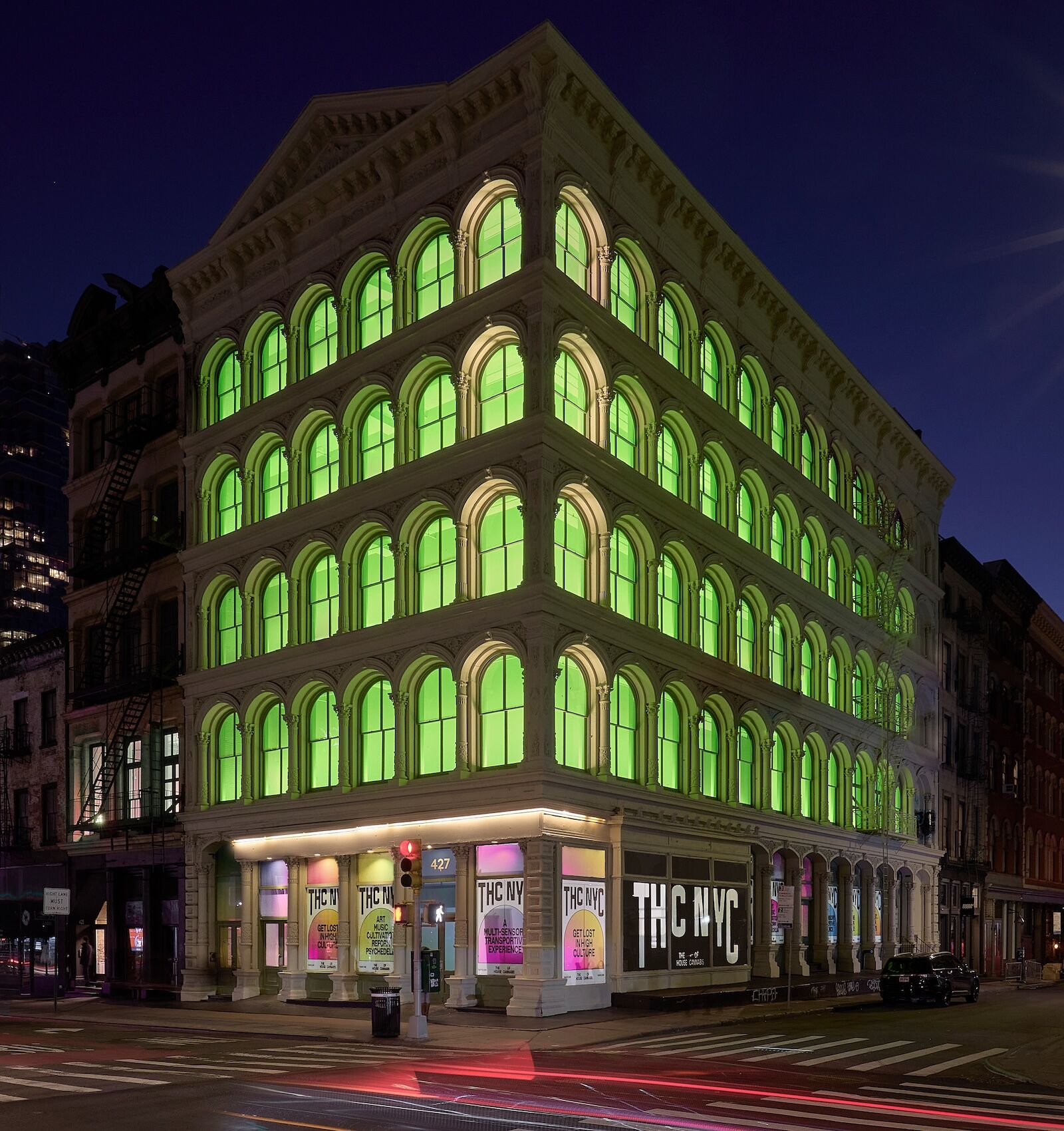
Photo: THCNYC / Lauren Yoshiko
With the convenient initials of THCNYC, The House of Cannabis is a Soho museum with more than 10 immersive exhibits centered on the art and history of the plant. One room has a light and music show, while others have short films and gallery spaces. There’s even a mini cannabis grow and a smells room to learn more about the terpenes that give off the distinct cannabis aroma.
The House of Cannabis: 427 Broadway, New York, NY 10013
Chef Roilty in Denver
Chef Jarod Farina, who goes by the moniker Chef Roilty, has taught cooking classes and major restaurants and been on TV shows like Beat Bobby Flay, Chopped 420, and Southern Charm. These days, he’s running cannabis-minded cooking classes and fine-dining dinners in Denver that feature extravagant dishes like an infused pasta served on a pillow filled with cannabis smoke.
Chef Roilty: Contact for events and experiences
Ivy Hall in Chicago
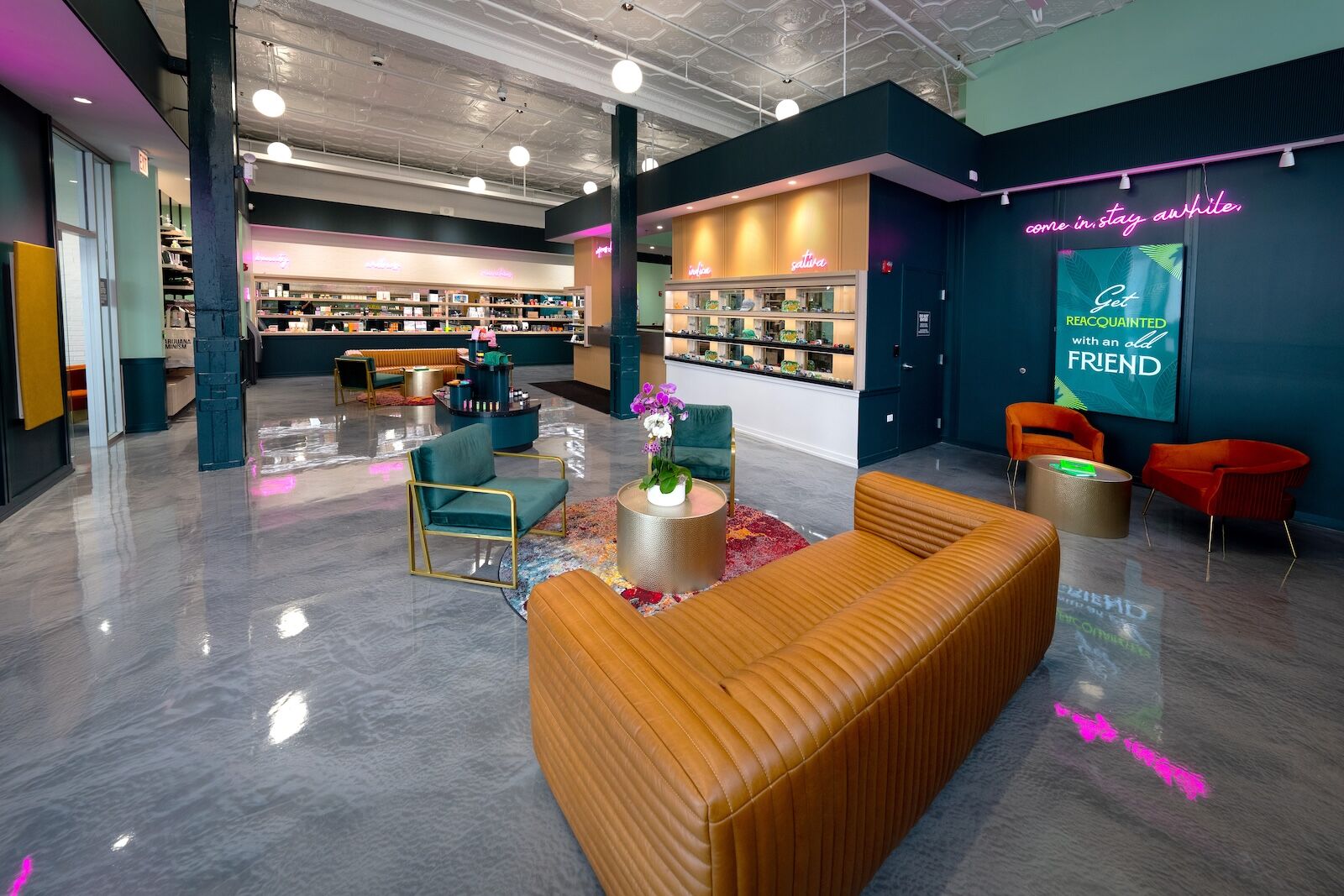
Photo: Ivy Hall / Lauren Yoshiko
Chicago natives Nigel Dandridge and David Berger run this Bucktown neighborhood dispensary. It opened with one of the city’s social equity licenses, and is just as much a palace to relax and learn about cannabis as it is a place to buy it. There’s a sensory bar to learn about aromas and terpenes, seating areas, and attractive design elements both new and historic.
Ivy Hall: 1720 N Damen Ave, Chicago, IL 60647
Mountain Views Tree House Joint in Monroe, Washington
Glamping goes cannabis friendly at Mountain Views Tree House Joint, a four-acre property an hour north of Seattle. The four sustainably built treehouses are built into the forest and have in-unit heat, bedding, and full bathrooms. Cannabis use is permitted inside and out, and high-end smoking tools like the Stüdenglass gravity bong are available on request. Wandering the woods and immersing in nature is activity enough, though there are also seasonal events and a communal camp fire. Don’t forget to say hi to the four dogs, two fainting goats, horse, swearing African gray parrot, two alpacas, mini pig, cat, and two babydoll sheep.
Mountain Views Tree House Joint: 14308 Reiner Rd, Monroe, WA 98272
TokinTree in Cave Junction, Oregon
Located near the Oregon-California border, TokinTree House has treetop accommodations located on a working cannabis farm (meaning all guests need to be 21 or older). The main four-person treehouse sits 35 feet off the ground and is reached by stairs and a suspension bridge. Inside, there’s a kitchenette, full bathroom, couch, sleeping loft with a queen bed, and fresh ground coffee and locally grown munchies. The true selling point is it’s position overlooking the farm where you can watch the plants grow and see the activity of harvest season in the fall. The property also has a boat converted into accommodations. It’s all run by Out ‘n’ About Treehouse Treesort, which has a series of other treehouses, ziplines, events, and outdoor activities.
TokinTree: 300 Page Creek Road Cave Junction, OR 97523
NuWu North in Las Vegas
The biggest name in cannabis in Sin City is the massive Planet 13 that has all of the glitz and over-the-top glamor one would expect from a Las Vegas establishment. Lesser known but arguably even more interesting (and bigger) is NuWu, a 40,000-square-foot dispensary with a consumption-friendly courtyard, Sky High Lounge overlooking the Fremont Street Experience, and the area’s only 24/7 drive-through. It’s operated by the Las Vegas Paiute Tribe, and is hands-down one of the premiere places to shop for and consume cannabis in Las Vegas.
NuWu North: 11527 Nu-Wav Kaiv Blvd, Las Vegas, NV 89124